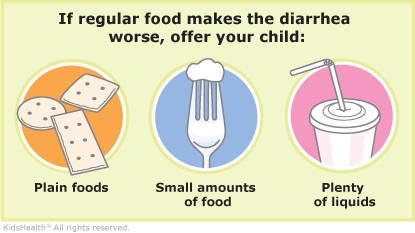Some kids get diarrhea from their chemotherapy medicines. It can happen right after chemotherapy or a few days later. Diarrhea causes a lot of water to leave the body and can lead to dehydration, so it's important that your child drink a lot of liquids. Here's how to care for your child at home.



Your child has:

Your child becomes confused or has a seizure.

When does chemo-related diarrhea need more testing? If your child is not improving with the health care provider's recommendations, the diarrhea may be happening for other reasons. Other causes of diarrhea when having chemo can include overgrowth of bacteria in the gut, problems absorbing fats, food intolerances, infections, or a backup of poop that leads to liquid leaking out around the poop. Talk to the health care provider if the diarrhea is not improving.